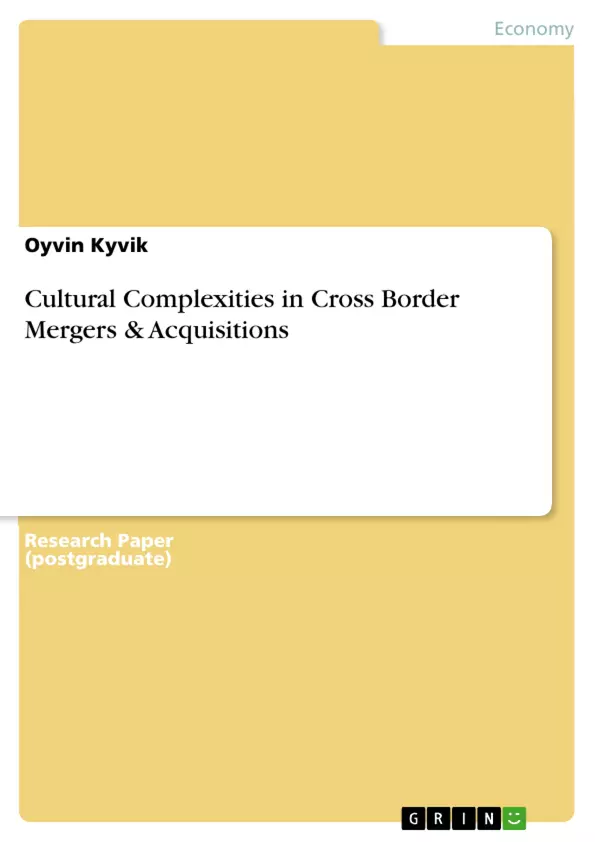Based on a review of pertinent literature, the paper discusses the role and the complexities of cross-border mergers and acquisition in firms´ internationalization. The various stages that firms customarily go through as part of an international merger and acquisition process are outlined and debated from both a theoretical and practical perspective. Particular challenges related to the management of the post- merger integration process and complexities related to differences in national and organizational cultures, organizational design and knowledge-structures between the acquirer and the target company are discussed. It is argued that appropriate management of the merging firms´ human resources as the merging firms´ smallest common denominator, is the key to optimize the outcome of cross-border transactions and to achieve budgeted post-merger benefits. Based on the conceptual discussion, the paper concludes with key recommendations for how to manage a cross-border deal to minimize risks and increase the probability of achieving the objectives.
Inhaltsverzeichnis (Table of Contents)
- Introduction
- Theoretical perspectives
- Stages in the international M&A process
- Cross-border acquisition as a strategic choice in the firm's evolution
- Preparation and selection of M&A candidate(s)
- Due diligence, evaluation and strategic decision
Zielsetzung und Themenschwerpunkte (Objectives and Key Themes)
This paper aims to provide a comprehensive understanding of the complexities involved in cross-border mergers and acquisitions (M&A) within the context of firms' internationalization. The discussion encompasses both theoretical frameworks and practical considerations, particularly highlighting the challenges of post-merger integration and cultural differences.
- The role of cross-border M&A in internationalization strategies
- The challenges of managing cultural differences during M&A
- The critical importance of human resource management in successful integration
- The impact of corporate culture on M&A outcomes
- The stages involved in the international M&A process
Zusammenfassung der Kapitel (Chapter Summaries)
- Introduction: Introduces the topic of cross-border M&As as a prominent aspect of firm internationalization, highlighting their increasing prevalence in the global business environment. The paper focuses on the human element within M&A, emphasizing the role of human resource management in achieving successful outcomes.
- Theoretical perspectives: Explores various theoretical perspectives explaining firms' internationalization strategies, including transaction cost economics, resource-based view, and entrepreneurial theories. The discussion emphasizes the complexity of cross-border M&A as a mode of internationalization and highlights its inherent risks and potential benefits.
- Stages in the international M&A process: Analyzes the key stages of a cross-border M&A process, encompassing strategic choice, candidate selection, due diligence, and the critical integration process. The chapter emphasizes the importance of careful strategic evaluation, cultural considerations, and a comprehensive understanding of the target company's internal dynamics.
Schlüsselwörter (Keywords)
The paper revolves around the central themes of mergers and acquisitions, intercultural management, corporate culture, international business, and human resources. It delves into the complexities of integrating diverse cultures during cross-border M&A, emphasizing the role of human resource management in mitigating risks and optimizing outcomes. The paper explores various theoretical perspectives and practical considerations associated with cross-border M&A, emphasizing the importance of strategic planning and cultural sensitivity for successful implementation.
Frequently Asked Questions
What are the main challenges in cross-border M&A?
The main challenges include cultural differences (national and organizational), post-merger integration complexities, and differences in organizational design.
Why is Human Resource Management critical in mergers?
Human resources are the "smallest common denominator" of merging firms. Proper management is key to optimizing outcomes and achieving post-merger benefits.
What are the stages of an international M&A process?
The process typically involves strategic choice, preparation and selection of candidates, due diligence, evaluation, and finally, post-merger integration.
How do national cultures affect integration?
Differences in national values and communication styles can lead to misunderstandings and resistance during the integration of the target company.
What is the role of Due Diligence in cross-border deals?
Due Diligence is the thorough evaluation of the target company to identify risks, confirm strategic fit, and make an informed decision before the merger.
- Quote paper
- PhD Oyvin Kyvik (Author), 2011, Cultural Complexities in Cross Border Mergers & Acquisitions, Munich, GRIN Verlag, https://www.grin.com/document/166438



